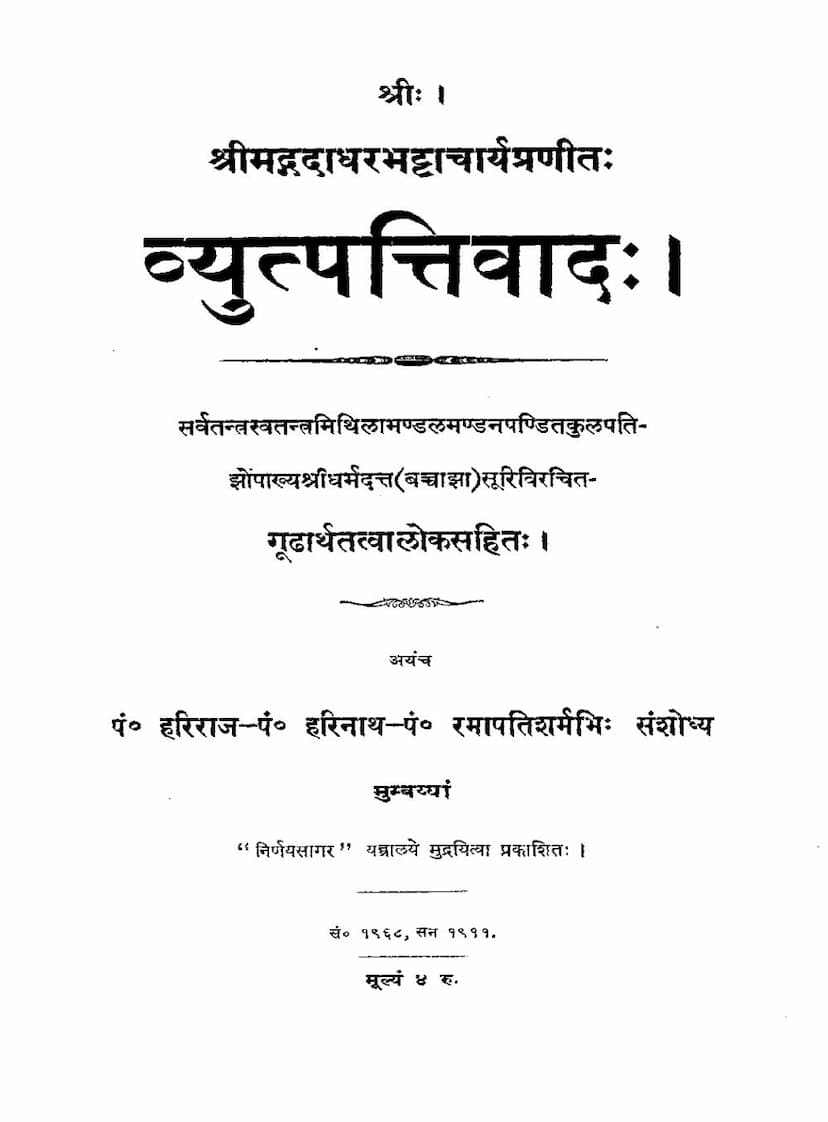Vyutpattivada Gudharthatattvaloka
Added to library: September 2, 2025

Summary
This is a comprehensive summary of the Jain text "Vyutpattivada Gudharthatattvaloka" by Dharmadattasuri, based on the provided pages:
Overall Nature of the Work:
- Commentary on Vyutpattivada: The book is a commentary titled "Gudarthatattvaloka" (meaning "Light of the True Meaning of Hidden Concepts") on the "Vyutpattivada" (likely a philosophical or linguistic treatise on derivation and meaning).
- Authoritative Authorship: The "Vyutpattivada" itself is attributed to the esteemed scholar Shrimad Gadadhara Bhattacharya. The commentary is by Jhoppakhya Shridharmadatta (Bachha Jha) Suri, described as a luminary and scholar from Mithila, who is also referred to as Dharmadatta.
- Publication Details: It was published in Mumbai by Nirnaya Sagar Yantralaya in Samvat 1968 (corresponding to 1911 CE). The price was 4 Rupees.
- Editorial Team: The text was reviewed and edited by Pandit Hariraj, Pandit Harinath, and Pandit Ramapati Sharma.
- Jain Context: The text is presented with "Shrih" at the beginning and "JAIN EDUCATION INTERNATIONAL FOR PRIVATE AND PERSONAL USE ONLY" at the bottom of page 1, indicating a connection to Jain traditions or a Jain audience for this particular edition.
Content Summary (Based on Initial Pages):
-
Introduction (Bhumika - Page 3):
- The introduction highlights the importance of the works of Kanāda (associated with Vaisheshika philosophy and grammar) and Pāṇini (the grammarian) for all branches of knowledge.
- It emphasizes that a deep understanding of these two disciplines is crucial for properly validating the propositions of any philosophical or scientific text.
- The introduction singles out Gadadhara Bhattacharya's "Vyutpattivada" as an exceptionally insightful and currently influential work.
- It states that the need for a commentary, a "Tattvaloka" (meaning "light of truth/essence"), on this subtle and profound text was recognized.
- The commentary by Shridharmadatta (Bachha Jha) is presented as fulfilling this need, thanks to his grace.
- The publishers express their enthusiasm and gratitude for the opportunity to publish this work, mentioning that it will be evident in its value upon reading.
- Special thanks are extended to Pandit Vasudeva Panashikar Shastri for his significant efforts in editing and bringing the text to light.
- The publishers also announce their intention to release other revised Jain educational texts, including those related to Nyaya and Grammar, with useful annotations, through Nirnaya Sagar.
- A list of places where the book can be purchased is provided, including Varanasi and Ballia districts.
-
Opening of the Vyutpattivada (Page 5):
- The text begins with "Shri Ganeshaya Namah" (Salutations to Lord Ganesha).
- The very first line of the main text states: "In Shaabdbodha (verbal cognition/understanding of words), the connection of one word's meaning with another word's meaning appears through the convention of connection (sargasamargaya)."
- This is followed by a verse (sloka 1) that appears to be an invocation or dedication, speaking of a supreme being who, due to taking on the guise of a servant, became humble despite being the lord of the three worlds and the destroyer of the ego of the triple world. The verse concludes with an auspicious wish.
- The second verse (sloka 2) introduces the commentary: "This Vyutpattivada Gudharthatattvaloka is being expanded by Dharmadatta, born in the Maithila lineage, who is wise." This confirms the author and the nature of the work.
- The subsequent lines of page 5 delve into complex philosophical and linguistic discussions, particularly concerning "Akanksha" (expectancy or semantic relevance between words) and its role in forming "Shaabdbodha" (verbal cognition). The text starts to dissect different theories and concepts related to how meaning is constructed from words and their relationships.
Key Concepts Introduced (Early Pages):
- Shaabdbodha: The central theme is how we arrive at a meaningful understanding of sentences (Shaabdbodha).
- Samsarga (Connection/Relation): The text immediately focuses on the concept of how the meanings of words connect with each other to form a coherent understanding.
- Abheda (Identity/Non-difference): It's mentioned that this connection can sometimes be one of identity.
- Akanksha (Expectancy/Relevance): The discussion quickly moves to the role of expectancy between words, which is vital for forming Shaabdbodha. The text begins to explore how Akanksha functions and its relation to cause and effect.
- Matantara Khandana (Refutation of Other Theories): The commentary explicitly mentions engaging in refuting other philosophical schools of thought (japa and vyavahara) in its discussion of Vyutpatti (derivation and meaning).
In essence, the book is a scholarly and detailed analysis of how language creates meaning, focusing on the principles of connection between words, the role of expectancy, and the refutation of alternative theories, all within a commentary tradition on an important philosophical work. The Jain context suggests that this commentary may be interpreting these linguistic and philosophical concepts through a Jain philosophical lens, or it's a respected text within the Jain intellectual tradition.